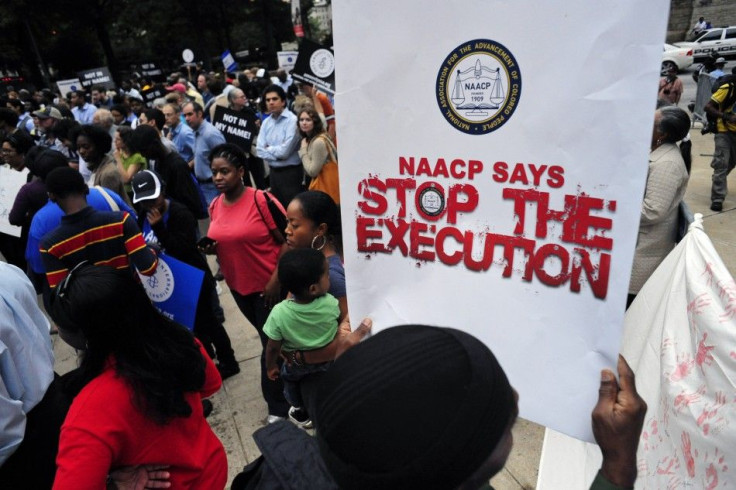Troy Davis Execution: Supreme Court Grants Shocking Last-Minute Delay

The Supreme Court caused an astonishing last-minute delay to Troy Davis' execution on Wednesday, saying it needed time to review his appeal.
Davis, 42, was scheduled to be executed by lethal injection at 7 p.m. EDT, but his lawyers and supporters have been fighting feverishly to delay the execution because of doubts about the evidence used to convict him of murder 20 years ago.
It was not clear how long the delay would last, or even if it would lead to a stay on the execution. New York Times reporter Kim Severson tweeted at 7:45 p.m. that a final decision could come in minutes or hours.
Still, this delay, however temporary, is a miracle itself, Benjamin Jealous, president of the National Association for the Advancement of Colored People, said, Severson reported.
On Tuesday, the Georgia Pardons Board had refused to commute Davis' sentence to life in prison without parole and denied his lawyers' request that he be allowed to take a polygraph test. Despite public outcry and pressure from prominent individuals and organizations, the board refused to revisit its decision on Wednesday. The Georgia Supreme Court also refused to intervene.
Davis was convicted in 1991 of killing Mark MacPhail, a Savannah, Ga., police officer, in 1989. He insisted he was innocent, and his lawyers fought to get him a new trial, arguing that the evidence and testimonies used to convict him were flawed.
MacPhail was working as a security guard in 1989 and was shot while trying to help a homeless man whom Davis was beating in a Burger King parking lot, prosecutors said. No gun was found; Davis was found guilty on the basis of shell casings from an earlier shooting he had been convicted of, and testimony from several eyewitnesses.
Of the nine witnesses who testified against Davis in his original trial, seven have since signed affidavits changing all or part of their testimonies. Some said the police had pressured them to implicate Davis, and some went on to implicate another man, Sylvester Coles.
Such incredibly flawed eyewitness testimony should never be the basis for an execution, Stephen Marsh, one of Davis' lawyers, told The Atlanta Journal-Constitution. To execute someone under these circumstances would be unconscionable.
But state and federal courts ruled that the defense had not provided a substantive claim of innocence.
Davis' execution was originally scheduled for July 2007, but it was postponed three times because of last-minute efforts by his supporters. In August 2009, the Supreme Court ordered the federal district court in Georgia to grant Davis a new evidentiary hearing, which was held in 2010. The district court upheld the conviction, calling the defense's arguments largely smoke and mirrors.
This time around, more than 900,000 people have signed petitions urging the pardons board to grant clemency, commuting Davis' death sentence to life in prison without parole. He has received support from Amnesty International and the NAACP, as well as from an array of prominent political and religious figures, including former President Jimmy Carter, Pope Benedict XVI, Archbishop Desmond Tutu, the Rev. Al Sharpton and former FBI Director William Sessions.
There is no DNA, no gun, no physical evidence, Sharpton, a longtime civil rights activist, told protesters who gathered on Wednesday outside the prison in Jackson, Ga., where Davis was being held. That is unheard of in a civilized society. This is much bigger than Troy Davis -- it's about people having the right to seek redress.
Sharpton was not the only person who saw far-reaching implications in Davis' experience. The case gripped the country and many parts of the world, and many protesters said that even if Davis were executed in spite of their efforts, they would continue to work to prevent future executions in cases with disputed evidence.
© Copyright IBTimes 2024. All rights reserved.





















